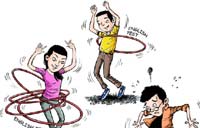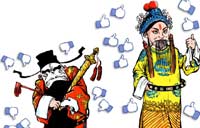The Chinese art of mythmaking
Updated: 2014-05-29 10:36
By Raymond Zhou(China Daily)
|
||||||||
 |
| Language should be a matter of choice |
Harvard Mottos is another such book, but its author seems to have more flesh and blood than Paul Thomas of Executive Power. Danny Feng is reported to be a Beijinger who has studied in the United States. After the scam was exposed, Feng said he based his book on an online post by expanding on each of the 20 mottos. It was a fly-by-night operation, taking only two months from the book's conception to hitting store shelves.
The trend can be traced back to 2000 when Liu Yiting, the Harvard Girl was published. Liu's mother, Liu Weihua, wrote a book chronicling her methodology of teaching her daughter that ended up with the younger Liu being admitted into Harvard's undergraduate program. The book sold a cumulative 2 million copies and spawned another book of rebuttal.
In Truth, Xiao Yu wrote that the way Liu was trained, as described in her mother's book, is traditionally Chinese rather than Western. He adds: "The reason the myth has held up is the word Harvard. Most in China do not know the real Harvard and they placed a halo of admiration around it."
At least Liu Yiting is a real person who really got into Harvard and her mother really wrote that book.
Most of those responsible for the Harvard-related success stories may not even have a college diploma. Many of those inspirational books were hack jobs by those with marketing savvy and whose writing consists mostly of copying and pasting from online sources.
My parents did not write books. But they instinctively used comparison as a means of motivating me while I was young. "That kid next door is studying from 5 am to 10 pm," or, "He's got all As, but what have you got?"
It dawned on me that my next-door neighbor was actually serving as a kind of miniature Harvard in my parents' pedagogy. But as a real person he posed many inconveniences, especially when he started to flunk his courses. But Harvard is always there, so remote and so impersonal that it can be whatever you need it to be.
Chinese websites are overflowing with feel-good pieces of factoids and dubious information.
For more X-Ray stories, click here

 Music at her fingers
Music at her fingers
 Across America Over the Week (Jan 16 - Jan 22)
Across America Over the Week (Jan 16 - Jan 22)
 Spend Chinese New Year in style
Spend Chinese New Year in style
 Ili river valley becomes a popular destination for swans
Ili river valley becomes a popular destination for swans
 Philip Ma: from scientist to businessman
Philip Ma: from scientist to businessman
 Birmingham's Spotlight on China dinner
Birmingham's Spotlight on China dinner
 How to distinguish doucai, wucai, Famille-rose and enamel porcelain
How to distinguish doucai, wucai, Famille-rose and enamel porcelain
 Xinjiang lake in bumper fishing season
Xinjiang lake in bumper fishing season
Most Viewed
Editor's Picks

|

|

|

|

|

|
Today's Top News
Houston's SW Chinatown
China to focus on reforms, opening of capital market
Slowdown brings new risks to banks
Trade group calls for BIT
Market status for China is 'political' issue
Birmingham's Spotlight on China dinner
Bank takes renminbi-clearing seriously
Traditional Garb
US Weekly

|

|










